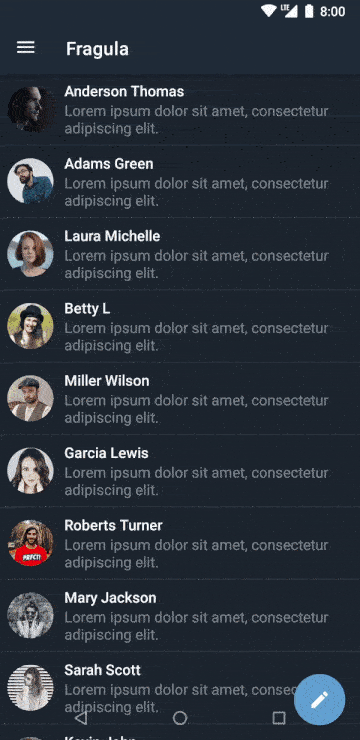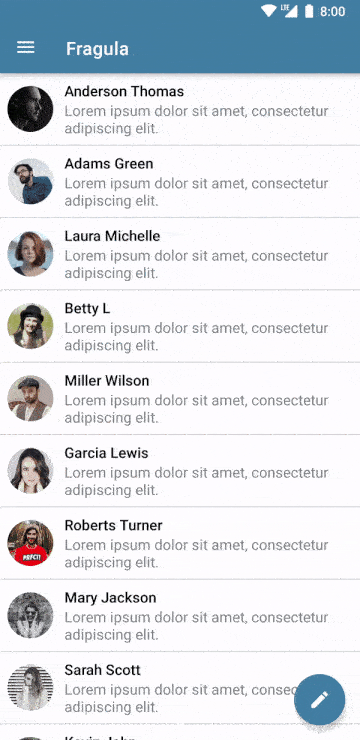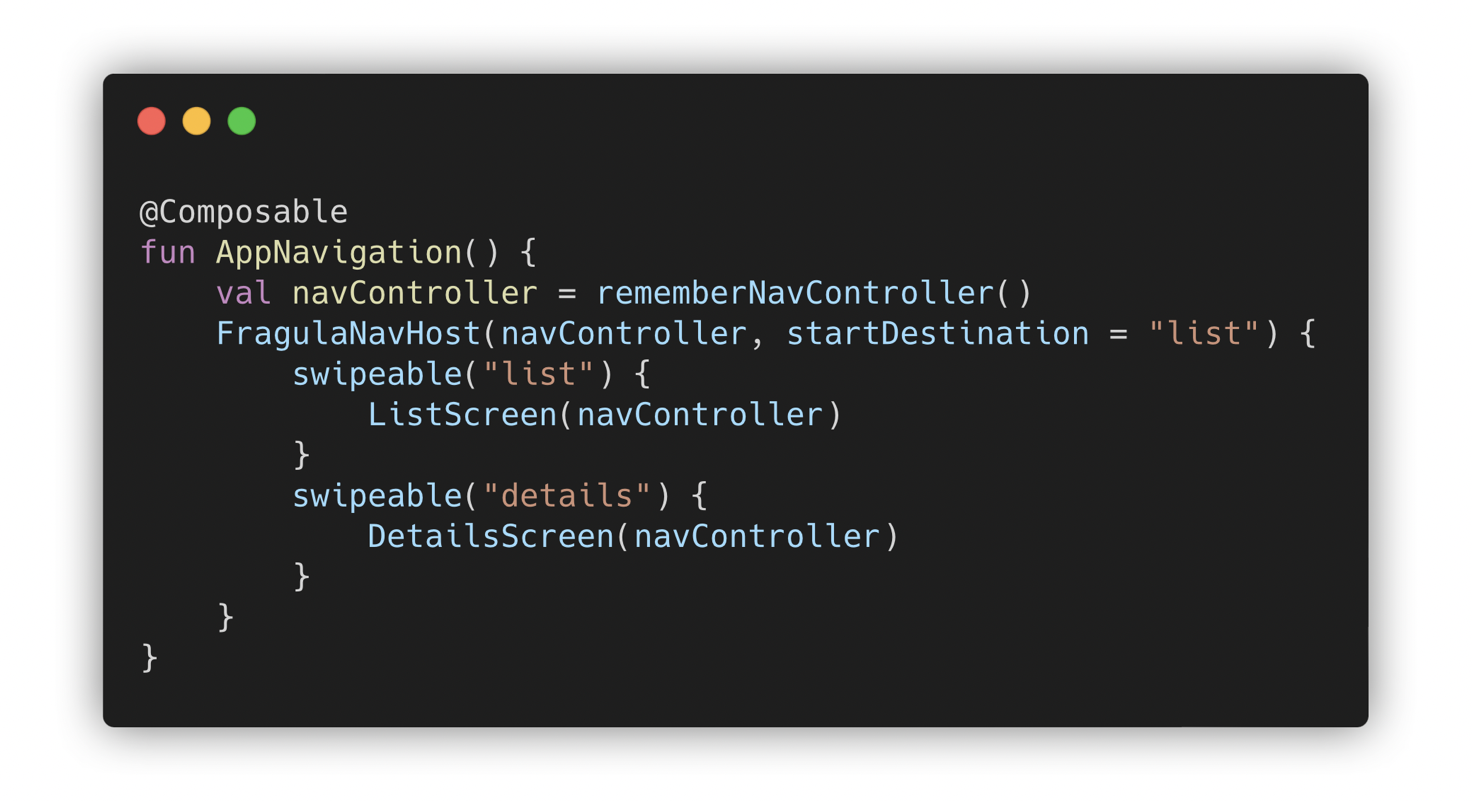Fragula is a swipe-to-dismiss extension for navigation component library for Android.
It is an adaptation of an earlier version created by @shikleev and now maintained in this repository.
| Dark Theme | Light Theme |
|---|---|
 |
 |
The fragula-core module provides everything you need to get started with the library.
It contains all core and normal-use functionality.
Add this to your module’s build.gradle file:
dependencies {
...
implementation 'com.fragula2:fragula-core:2.6'
}The fragula-core module does not provide support for jetpack compose, you need to add the
fragula-compose dependency in your project.
First, you need to replace NavHostFragment with FragulaNavHostFragment in your layout:
<!-- activity_main.xml -->
<androidx.fragment.app.FragmentContainerView
xmlns:android="http://schemas.android.com/apk/res/android"
xmlns:app="http://schemas.android.com/apk/res-auto"
android:layout_width="match_parent"
android:layout_height="match_parent"
android:name="com.fragula2.FragulaNavHostFragment"
android:id="@+id/nav_host"
app:navGraph="@navigation/nav_graph"
app:defaultNavHost="true" />Second, you need to replace your <fragment> destinations in graph with <swipeable> as shown below:
<!-- nav_graph.xml -->
<navigation xmlns:android="http://schemas.android.com/apk/res/android"
xmlns:app="http://schemas.android.com/apk/res-auto"
xmlns:tools="http://schemas.android.com/tools"
android:id="@+id/nav_graph"
app:startDestination="@id/detailFragment">
<swipeable
android:id="@+id/detailFragment"
android:name="com.example.fragula.DetailFragment"
android:label="DetailFragment"
tools:layout="@layout/fragment_detail" />
...
</navigation>Finally, you need to set opaque background to your fragment’s root layout to avoid any issues with swipe animation.
<!-- fragment_detail.xml -->
<androidx.constraintlayout.widget.ConstraintLayout
xmlns:android="http://schemas.android.com/apk/res/android"
android:layout_width="match_parent"
android:layout_height="match_parent"
android:background="?android:colorBackground"
android:layoutDirection="local">
...
</androidx.constraintlayout.widget.ConstraintLayout>That's it! No need to worry about gestures, animations and switching the navigation framework you already use in your project.
In general, you should work with Fragula as if you would work with normal fragments. You should strongly prefer passing only the minimal amount of data between destinations, as the total space for all saved states is limited on Android.
First, add an argument to the destination:
<swipeable
android:id="@+id/detailFragment"
android:name="com.example.fragula.DetailFragment">
<argument
android:name="itemId"
app:argType="string" />
</swipeable>Second, create a Bundle object and pass it to the destination using navigate() as shown below:
val bundle = bundleOf("itemId" to "123")
findNavController().navigate(R.id.detailFragment, bundle)Finally, in your receiving destination’s code, use the getArguments() method to retrieve the
Bundle and use its contents:
val textView = view.findViewById<TextView>(R.id.textViewItemId)
textView.text = arguments?.getString("itemId")It's strongly recommended to use Safe Args plugin for navigating and passing data, because it ensures type-safety.
Currently multiple backstacks is not supported, which means you can’t safely use extensions such
as setupWithNavController(...) without losing your current backstack.
This issue affects both BottomNavigationView and NavigationView widgets.
If you want to change the direction of swipe gesture, you can do that by setting
app:swipeDirection="..." manually in your navigation container. This example below sets up
vertical swipe direction.
<!-- activity_main.xml -->
<androidx.fragment.app.FragmentContainerView
xmlns:android="http://schemas.android.com/apk/res/android"
xmlns:app="http://schemas.android.com/apk/res-auto"
android:layout_width="match_parent"
android:layout_height="match_parent"
android:name="com.fragula2.FragulaNavHostFragment"
android:id="@+id/nav_host"
app:swipeDirection="top_to_bottom"
app:navGraph="@navigation/nav_graph"
app:defaultNavHost="true" />You can use either left_to_right (default) or right_to_left for horizontal direction.
For vertical direction you can use only top_to_bottom, the bottom_to_top is not supported due
to internal ViewPager2 restrictions.
Note If you having an issues with nested scrollable views, this appears to be a scroll issue in ViewPager2. Please follow Google’s example to solve this.
You may want to know when the scrolling offset changes to make smooth transitions inside your
fragment view. To start listening scroll events you need to retrieve SwipeController and set
OnSwipeListener as shown below:
class DetailFragment : Fragment(R.layout.fragment_detail) {
private lateinit var swipeController: SwipeController
private lateinit var swipeListener: OnSwipeListener
override fun onViewCreated(view: View, savedInstanceState: Bundle?) {
super.onViewCreated(view, savedInstanceState)
// ...
swipeController = findSwipeController()
swipeListener = OnSwipeListener { position, positionOffset, positionOffsetPixels ->
// TODO animate views using `positionOffset` or `positionOffsetPixels`.
// the `position` points to the position of the fragment in backstack
}
swipeController.addOnSwipeListener(swipeListener)
}
override fun onDestroyView() {
super.onDestroyView()
swipeController.removeOnSwipeListener(swipeListener)
}
}Note Currently shared element transitions between destinations are not supported in any form. Remember that you must remove the listener when the fragment view is destroyed.
In most of the cases there is no need to change any values, but if you wish to override these, there are attributes provided:
<style name="AppTheme" parent="Theme.MaterialComponents.Light.NoActionBar">
<item name="colorPrimary">...</item>
<item name="colorPrimaryDark">...</item>
<item name="colorAccent">...</item>
<!--
This overrides the color used for the dimming when fragment is being dragged.
The default value is #000000 for both light and dark themes.
-->
<item name="fgl_scrim_color">#000000</item>
<!--
This overrides the amount of dimming when fragment is being dragged.
Think of it as a `fgl_scrim_color` alpha multiplier.
-->
<item name="fgl_scrim_amount">0.15</item>
<!--
This overrides the parallax multiplier when fragment is being dragged.
It determines how much the underneath fragment will be shifted
relative to the visible fragment (that is being dragged).
-->
<item name="fgl_parallax_factor">1.3</item>
<!--
This overrides the duration of swipe animation using `navController.navigate(...)`
and `navController.popBackStack()` methods.
-->
<item name="fgl_anim_duration">500</item>
<!--
This overrides the elevation applied to the fragment view.
Note that it doesn't support `android:outlineAmbientShadowColor`
and `android:outlineSpotShadowColor` attributes in your theme.
-->
<item name="fgl_elevation">3dp</item>
</style>The fragula-compose module provides support for jetpack compose.
It may not contain all the features described earlier. If you want to make a feature request,
consider creating an issue on GitHub.
Add this to your module’s build.gradle file:
dependencies {
...
implementation 'com.fragula2:fragula-compose:2.6'
}The fragula-compose module does not provide support for fragments, you need to add the
fragula-core dependency in your project.
First, you need to replace NavHost(...) with FragulaNavHost(...) in your main composable:
// MainActivity.kt
setContent {
AppTheme {
Surface(
modifier = Modifier.fillMaxSize(),
color = MaterialTheme.colors.background,
) {
val navController = rememberFragulaNavController()
FragulaNavHost(navController, startDestination = "list") {
// ...
}
}
}
}Second, you need to replace your composable(...) destinations with swipeable(...) as shown below:
val navController = rememberFragulaNavController()
FragulaNavHost(navController, startDestination = "list") {
swipeable("list") {
ListScreen(navController)
}
swipeable("details") {
DetailsScreen(navController)
}
}Finally, you need to set opaque background to your composables to avoid any issues with swipe animation.
@Composable
fun DetailsScreen(navController: NavController) {
Box(modifier = Modifier.fillMaxSize()
.background(Color.White)
) {
// TODO content
}
}Fragula also supports passing arguments between composable destinations the same way as in the
androidx navigation library. Create a deeplink and specify the argument type, then you can extract
NavArguments from the NavBackStackEntry that is available in the lambda of the swipeable()
function.
NavHost(startDestination = "profile/{userId}") {
// ...
swipeable("profile/{userId}", arguments = listOf(
navArgument("userId") { type = NavType.StringType }
)) { backStackEntry ->
ProfileScreen(navController, backStackEntry.arguments?.getString("userId"))
}
}To pass the argument to the destination, simply call navController.navigate("profile/user1234").
For more information read the article Navigating with Compose
on official android developers website.
As already have been mentioned, Fragula doesn't support multiple backstacks both in XML and Compose.
If you really need this feature in your app, consider creating a nested NavHost for bottom tabs only.
If you'd like to discover more customization features, here is parameters list.
@Composable
fun FragulaNavHost(
navController: NavHostController,
startDestination: String,
modifier: Modifier = Modifier,
route: String? = null,
onPageScrolled: (Int, Float, Int) -> Unit, // Scroll listener (position, offset, offsetPixels)
scrimColor: Color = ScrimColor, // Color used for the dimming
scrimAmount: Float = 0.15f, // Percentage of dimming (depends on drag offset)
parallaxFactor: Float = 1.3f, // Parallax multiplier (depends on drag offset)
animDurationMs: Int = 500, // Duration of swipe animation
elevation: Dp = 3.dp, // Elevation applied on the composable
builder: NavGraphBuilder.() -> Unit
) {
// ...
}




